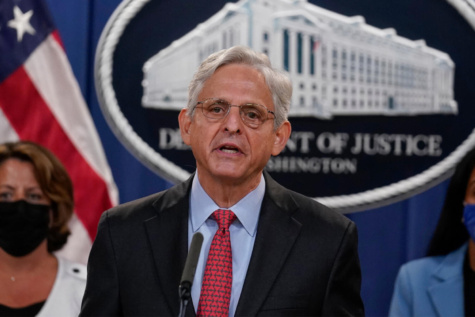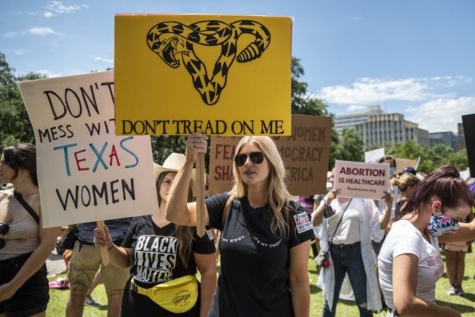
Reaghan Mulligan | Newsroom Manager
September 17, 2021
The new Texas abortion law (SB8)—one of the most restrictive of its kind—turned heads and widened eyes across the nation. Despite the multiple attempts at destabilizing the 1973 Roe v. Wade Supreme Court decision, which protects abortion rights, most prior cases had not gained significant traction, that is until the Texas decision on September 1 bypassed the interference of the Supreme Court.
The 5-4 decision in favor of not blocking the bill represented the new configuration of the Court, now holding a prominent conservative majority, and foreshadowed—to some—the future of abortion access in America.

A multitude of reactions from across the nation arose the moment the Supreme Court finalized their partisan decision. As the Texas abortion proposition metamorphosed into law, its complex delegation of authority and consequences caught the attention of the Executive Branch.
Just days after the bill’s finalization, the Department of Justice (DOJ) issued a lawsuit against the state of Texas over the new abortion law.
Backed by a large majority of the Democratic party, including incumbent president Joe Biden, the Department of Justice filed the lawsuit in a Texas federal court, urging the judge to declare the bill unconstitutional.
According to the DOJ, the bill violated both the Constitution and the rights to abortion access granted by the Supreme Court in Roe v. Wade and continuously upheld by the Court since 1973.
“This law completely contradicts freedom of choice, and America was founded on the principle of liberty,” junior Kayla McLaughlin said.
Attorney General Merrick Garland cited the Supremacy Clause of the Constitution, stating that the decisions of the federal government were the supreme law of the land and could not be superseded by state decisions. He went on to reference a more recent court case, Planned Parenthood v. Casey (1992), noting that the state’s action directly contradicts the conclusions drawn by this case that prohibit government interference with the final decision to terminate a pregnancy. Garland argued that by passing the bill through state legislatures, it directly infringed upon past conclusions made by the federal court.
“The Department of Justice was valid in taking legal action against Texas, because Texas found a loophole in which they could potentially get away with the [abortion] ban,” junior Cheyenne Hayes said. “[The Texas abortion bill] is a huge restriction on women’s rights.”
The hope of the Democratic party is that Garland would invoke the Freedom of Access to Clinic Entrances (FACE) Act, which prohibits the obstruction of clinic accessibility, usually through physical actions.In the case of this bill, the incentivization of civilian interference in access to abortion inhibits a pregnant person’s access to clinics—whether the blockage is direct by reporting a person seeking an abortion, or indirect through accusation towards anyone involved in assisting access to an abortion, such as drivers, monetary providers, etc.
“The statute deputizes all private citizens, without any showing of personal connection or injury, to serve as bounty hunters authorized to recover at least $10,000 per claim from individuals who facilitate a woman’s exercise of her constitutional rights,” Garland said (AP News). “The obvious and expressly acknowledged intention of this statutory scheme is to prevent women from exercising their constitutional rights by thwarting judicial review.”
The dispute is to be settled in a Texas federal court, and the DOJ continues to encourage Judge Robert L. Pitman of Texas to place a temporary restrictive ban on SB8 in order to cease the efforts to almost completely restrict abortion access.
With a strong backing from the Democratic party and multiple pro-choice advocacy groups such as the ACLU and The Center for Reproductive Rights, the Department of Justice hopes to win the case in order to permanently block the enforcement of SB8 in Texas. With abortion clinics in the state ceasing to preform terminations—some even shutting down—abortion access in Texas has already been detrimentally docked, illustrating a long road ahead for reinstating sufficient access to abortions.

Leave a Reply